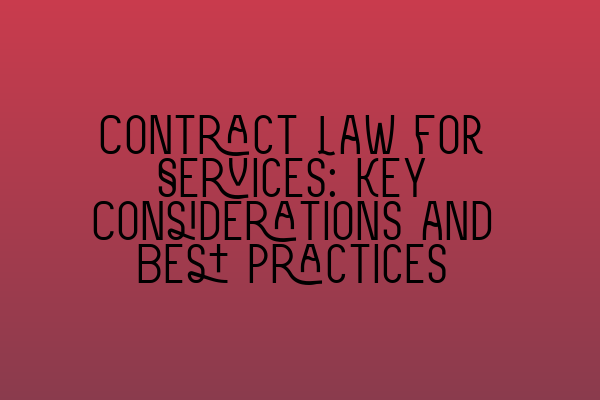Contract Law for Services: Key Considerations and Best Practices
Whether you are a business owner or an individual looking to hire a service provider, understanding contract law for services is crucial. Contracts serve as the foundation for any business transaction, outlining the rights and obligations of both parties involved. In this article, we will explore the key considerations and best practices when it comes to contracting for services.
What is a Service Contract?
A service contract is a legally binding agreement between two parties, where one party agrees to provide a specific service to the other party. The contract outlines the terms and conditions, including the scope of the services, payment terms, timelines, and any other relevant aspects of the agreement. It is important to have a well-drafted service contract in place to ensure that both parties understand their rights and responsibilities.
Key Considerations for Service Contracts
When entering into a service contract, there are several key considerations that you should keep in mind to protect your interests. Let’s dive into some of these considerations:
1. Scope of Services: Clearly define the scope of the services that will be provided. This includes outlining the specific tasks and deliverables involved, as well as any limitations or exclusions.
2. Payment Terms: Establish the payment terms, including the total cost, method of payment, and any milestones or payment schedules. Be explicit about any additional expenses or fees that may arise during the course of the service.
3. Timeline: Set realistic timelines for the completion of the services. Clearly define any deadlines or milestones to ensure that both parties are on the same page regarding the expected timeframe.
4. Intellectual Property: If the service provider will be creating or using any intellectual property during the course of the services, it is essential to address ownership and rights in the contract. Specify who will own the intellectual property and the extent of any licensing rights granted.
5. Confidentiality: Consider including confidentiality provisions to protect sensitive information shared during the course of the services. This is particularly important if the service provider will have access to proprietary or confidential information.
6. Termination: Include provisions that outline the grounds for termination, as well as the procedure to be followed in the event of termination. This will provide a clear path forward if either party wishes to end the agreement early.
7. Dispute Resolution: Consider including a dispute resolution clause, which outlines the process for resolving any conflicts that may arise. This can include mediation, arbitration, or litigation, depending on the preferences of the parties involved.
Best Practices for Service Contracts
Now that we have discussed some of the key considerations, let’s explore some best practices for drafting and managing service contracts:
1. Seek Legal Advice: It is always a good idea to seek legal advice when creating or reviewing a service contract. An experienced solicitor can help ensure that the contract is legally sound and protects your interests.
2. Use Clear and Concise Language: Keep the language in the contract simple and straightforward. Avoid using complex legal jargon that may confuse or mislead the parties involved.
3. Be Specific: Be as specific as possible when describing the services, timelines, and payment terms. This will help minimize any ambiguity or misunderstandings.
4. Review and Update: Regularly review and update your service contracts to ensure that they remain up-to-date and reflect any changes in your business or legal requirements.
5. Keep Records: Keep a copy of all signed contracts and any communication related to the services. This will serve as evidence in case of any disputes or disagreements.
In conclusion, understanding contract law for services is essential for any business or individual entering into a service agreement. By considering the key considerations and following best practices outlined in this article, you can create stronger service contracts that protect your interests and minimize the potential for disputes. If you need further assistance with your contract law needs, don’t hesitate to contact SQE Contract Law.
Related Articles:
– Navigating Legal Challenges and Pitfalls in Your Practice
– Barrister vs. Solicitor: A Comprehensive Comparison
– Understanding the SRA Competence Statement: A Guide for Solicitors
– Exploring Different Solicitor Specializations: Finding Your Niche
– Top Recommendations for Law Schools in the UK
